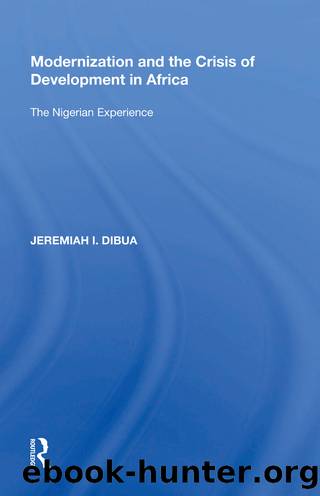Modernization and the Crisis of Development in Africa by Jeremiah I. Dibua

Author:Jeremiah I. Dibua [Dibua, Jeremiah I.]
Language: eng
Format: epub
Tags: Social Science, Ethnic Studies, African Studies, Sociology, General
ISBN: 9781351152907
Google: OJ1ADwAAQBAJ
Publisher: Routledge
Published: 2017-11-28T04:39:08+00:00
Chapter 6
The Dialectics of Agricultural Transformation
The crisis of development is perhaps more acutely manifested in the agricultural sector. This pathetic situation need not be so given the high amount of Nigeria's factor endowments. However, Forrest has argued that there is no acute agricultural crisis in Nigeria and that the crisis has been exaggerated. He pointed out that in the face of the chronic absence of reliable statistical data that characterize Nigeria's development efforts spurious data have been invented to create the picture of a serious agricultural crisis. Furthermore, while there probably is a crisis in the labor-intensive export crops especially with regard to the southern states of the country, the same is not true of the food sector. He noted that one of the reasons why the food crisis in Nigeria was exaggerated in the 1970s and 1980s was the desire to justify many different forms of intervention in agriculture, both domestic and foreign.1 Contrary to the argument of Forrest, there is no doubt that Nigeria has experienced a severe agricultural crisis since the 1970s: indeed, most scholars on Nigeria's agriculture, irrespective of their intellectual or ideological orientations, agree that the sector has experienced a severe crisis.
The agricultural crisis is partly manifested in the huge decline in the performance of the agricultural sector over the years.2 In 1964, agriculture accounted for 70 percent of Nigeria's GDP and 70.8 percent of the total exports, but in 1970, it accounted for 33.2 percent of the GDP and 9 percent of the total exports. In spite of the various forms of government intervention in the agricultural sector from the 1970s, the performance of agriculture did not improve. For instance in 1992, it accounted for 38.5 percent of the GDP and 1.4 percent of the total exports, and in 1999, it accounted for 41 percent of the GDP and 1.4 percent of the total exports. The crisis is also reflected in the decline in food production as reflected in the rising level of food imports, which rose from 46 million naira in 1965 to 2,115 million naira in 1981. At the same time, the percentage of food imports in relation to the total imports into the country rose from 7.6 in 1970 to 19, in 1982.3
Table 6.1 Basic indicators of agricultural performance in Nigeria, 1970-1992
Download
This site does not store any files on its server. We only index and link to content provided by other sites. Please contact the content providers to delete copyright contents if any and email us, we'll remove relevant links or contents immediately.
Cecilia; Or, Memoirs of an Heiress — Volume 1 by Fanny Burney(32558)
The Great Music City by Andrea Baker(32019)
Cecilia; Or, Memoirs of an Heiress — Volume 2 by Fanny Burney(31956)
Cecilia; Or, Memoirs of an Heiress — Volume 3 by Fanny Burney(31942)
We're Going to Need More Wine by Gabrielle Union(19046)
All the Missing Girls by Megan Miranda(16028)
Pimp by Iceberg Slim(14508)
For the Love of Europe by Rick Steves(14121)
Bombshells: Glamour Girls of a Lifetime by Sullivan Steve(14075)
Talking to Strangers by Malcolm Gladwell(13370)
Norse Mythology by Gaiman Neil(13365)
Fifty Shades Freed by E L James(13241)
Mindhunter: Inside the FBI's Elite Serial Crime Unit by John E. Douglas & Mark Olshaker(9343)
Crazy Rich Asians by Kevin Kwan(9292)
The Lost Art of Listening by Michael P. Nichols(7506)
Enlightenment Now: The Case for Reason, Science, Humanism, and Progress by Steven Pinker(7313)
The Four Agreements by Don Miguel Ruiz(6765)
Bad Blood by John Carreyrou(6621)
Weapons of Math Destruction by Cathy O'Neil(6280)
